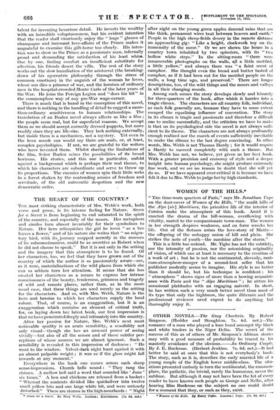WOMEN OF THE HILLS.* " THE time-worn quarters of Paris,"
says Mr. Jonathan Cape on the dust-cover of Women of the Hills, " the sunlit hills of the Alps [sic] Maritimes, the primitive life of the interior of Corsica make the atmosphere of this book. Amid it is enacted the drama of the hill-woman, overflowing with vitality, mated to the compassionate town-man. The woman in her strength despises weakness, and on force wrecks her life. Out of the flotsam arises the love-story of Miette- the offspring of the unhappy union of hill and plain. She strikes the note of youth—the sunshine after the storm."
This is a little too unkind. Mr. Tighe has not the subtlety, nor the intensity of passion, nor the astonishing originality of vision, of which one at least is necessary to the creation of a work of art ; but he is not the sentimental, slovenly, rant- cum-atmosphere-monger of a second-best seller that his publisher modestly seems to imagine. His style is no better than it should be, but his technique is confident ; his " atmosphere " shows signs of more than a bowing acquaint- ance with Paris and the " Alps Maritimes" ; he utters his occasional platitudes with an engaging naivete. In short, he has written such a very much better novel than most of its type that only the highbrow, the quite illiterate, and the professional reviewer need expect to do anything but thoroughly enjoy it.


























































 Previous page
Previous page